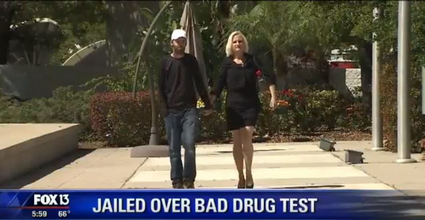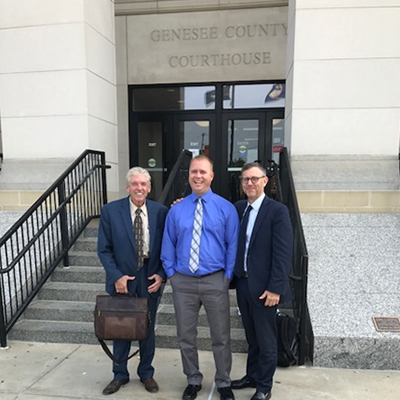
Jun 18, 2018 | Blog, News
A mother with no criminal record of 4 separated from her family and children after being jailed for vitamins being mistaken for drugs in a widely used drug test kit by police.
These Duquenois Levine reagent tests for marijuana will test positive for most any substances, candies, even the air will make them change color and false positive alert for a controlled substance.
Never consent to a search by a police officer. Tell the officer you do not consent to a search and ask if you are free to go. Don’t answer any questions , tell the officer you want your lawyer present during any questioning. These important phrases will keep you out of trouble and protect your constitutional rights!
Dec 22, 2017 | Blog, Criminal Defense Attorney Michael Komorn, Komorn Law Blog, Medical Marijuana Attorney Michael Komorn, Michigan Medical Marijuana Act, News
Two families — including one mom who alleges Child Protective Services took her suckling baby from her breast — are suing the state, alleging discrimination because they are medical marijuana users and poor.
In the lawsuit, attorney Michael KOMORN alleges the faith-based foster care and adoption agencies used by the State of Michigan were “grossly negligent” in opposing and delaying reunification of his clients’ children on the grounds of “poverty and illness” and in violation of the Michigan Medical Marijuana Act.
The suit also alleges Michigan laws allowing faith-based agencies “to discriminate on the basis of their religious beliefs are unconstitutional.”
“The mental image of CPS entering a hospital room accompanied by armed men and taking a newborn from a nursing mother’s breast and from the grandmother, shattering three generations of lives because CPS and Holy Cross (Children Services) found this family to be unfit because they were poor, diseased, medical marijuana card holders is excruciating,” Komorn said in the lawsuit filed Dec. 15 in the Court of Claims. “They treated this family the way the poor and leprous were treated until Jesus taught otherwise.”
Plaintiffs in the case are two families — Jennifer BARTLETT, her three children and parents, and Spring Lake residents Max LORINCZ and his wife, Erica CHITTENDON, and their son.
In addition to Clinton-based Holy Cross, defendants are the State of Michigan, Michigan Department of Health and Human Services Director Nick LYON, Executive Director Herman McCALL of Children Services Agency, Holy Cross worker Andrea HAGEN, Bethany Christian Services and its social worker, Kerry JIPPING, and CPS social worker Cody MAYHEM.
Kassie KRETZSCHMAR, a spokeswoman with Holy Cross, was not able to comment on Thursday because the agency had not seen the lawsuit.
A spokeswoman with Bethany Christian Services was working to get a comment from officials late Thursday.
The suit alleges gross negligence and wanton misconduct, and violation of the Elliot Larson Civil Rights Act.
According to the lawsuit, Bartlett’s children were removed from the family after a houseguest was killed in January 2016 when his gun accidentally discharged while her children were present.
Bartlett took her children to her parents’ home for safety while police investigated the case as a murder prior to blaming her boyfriend, who had spent time in jail.
Mayhew went to the children’s grandparents’ home and told Bartlett that the children were going to be removed because Bartlett “was not showing proper emotions and was making poor life choices,” the lawsuit alleges. Mayhew then drug-tested Bartlett, who tested negative, and she questioned the grandparents,’ who she said “were medical marijuana cardholders.”
Bartlett’s children were removed after a hearing in January 2016 and placed with Holy Cross.
Hagen, who was the Bartlett family’s caseworker, told the court the children shouldn’t be placed with her parents’ because her father had a 27-year-old conviction for use of half of a marijuana joint.
Drug officers later interviewed Bartlett to try to tie her and her boyfriend to drug trafficking in Detroit, which she denied. She was later charged with maintaining a drug house. She was eventually released on bond, but rearrested and charged with possession of drugs found in her dead guest’s pockets as well as conducting a criminal enterprise.
The lawsuit alleges that Hagen maintained Bartlett’s parents would not be good placement for her children because they “had a bad attitude” and were “uncooperative.” She also publicly revealed medical information about the grandmother in violation of federal privacy rules, the suit alleges.
Bartlett, who was pregnant, was released from jail in November 2016. A few hours after giving birth, a CPS worker saw her breastfeeding the baby and returned later with a court order and the police.
CPS “took (the) baby . . . from her mother’s breast and took her away, placing her with Holy Cross,” Komorn alleged.
After more than a year in foster care, Bartlett’s children were returned to her and the case closed in June 2017.
Komorn noted in the lawsuit that Hagen was “recently disciplined” by the Department of Health and Human Services for “misrepresenting health issues” of Bartlett’s parents “to justify placing the children with Holy Cross,” according to the lawsuit.
The allegations are similar in Lorencz’s case.
According to the lawsuit, Lorencz’s doctor recommended medical marijuana to alleviate chronic pain and he opted to use an oil extract from the plant. He was charged in September 2014 with misdemeanor possession of marijuana, which was bumped up to a felony possession after Lorencz refused to plead guilty to the misdemeanor.
The felony charge was later dismissed, but not until after the state “took away” Lorencz’s 5-year-old son, who was placed with Bethany Christian Services.
The lawsuit alleges Lorencz and Chittendon were not told that they could opt-out of a faith-based agency. When they learned they could, they sought a court order dismissing Bethany.
The lawsuit further alleges that Jipping testified at a hearing that “marijuana, even legally used for medical conditions, makes a parent unfit.” The caseworker acknowledged, however, that there was no evidence to prove drug abuse or that Lorencz was not in clear mind around his son when using medical cannabis.
Komorn further alleges that once Bethany Christian Services no longer had the pending criminal charges to use against his client, they “made other ridiculous claims” to keep his client’s son in foster care, including that he “plays lots of video games, his family is poor and his mother is ill.”
“Court hearings revealed that the behavior shown by Bethany Christian Services, including asking the child himself to choose between his parents and other living options, was contradictory to state procedures regarding foster care,” Komorn wrote in court documents. “The caseworker explicitly testified that she had not read or followed the (CPS’) policy. Instead . . . she follows Bethany Christian Services’ policy.”
According to Bethany Christian’s employee policy, “Under no circumstances will marijuana be considered a ‘legal drug.’ . . . Use of marijuana is not permitted under this policy even if the marijuana is used for medical purposes and is permitted under state law.”
The state’s Medical Marijuana Act notes that a “person shall not be denied custody or visitation” or a minor under the act unless the “person’s behavior is such that it creates an unreasonable danger to the minor that can be clearly articulated and substantiated.”
People v Max Lorincz
Crime labs ‘bend science’ to strip medical marijuana rights, lawsuit says
Federal class action lawsuit filed against MSP crime labs over marijuana reporting policy
Judge dismisses felony charges against Michigan man in medical pot case
Medical marijuana patients reunited with son after lengthy court battles, unfounded drug charges
Felony synthetic THC charge tossed in Michigan man’s battle with crime lab
Judge dismissed felony charge against medical marijuana patient Max Lorincz
Southfield attorneys accuse MSP Crime Lab of negligence and incompetence
Forensic scientists blast State Police crime lab THC policy as man fights to get son back
Crime Lab and Forensic Scandals
Study Finds That State Crime Labs Are Paid Per Conviction
Private Crime Labs Could Prevent Errors, Analyst Bias
Medical Marijuana Lawyers Want Crime Lab Removed From Michigan State Police
Medical marijuana lawyers want state crime lab moved out of Michigan State Police
Defense attorneys seek fed inquiry of MSP crime labs
Federal complaints allege marijuana misreporting by State Police crime lab
MSP defends marijuana crime lab reporting after FOX 17 investigation
Attorney: Crime labs ‘falsified’ marijuana reports
Michigan Prosecutors Pressured Lab on Medical Marijuana Results
Attorney Alleges Authorities `Bend The Science’ To Elevate Marijuana Cases
Drug felonies without credible proof? — Allegations of politicking in state police crime labs
Attorney: Crime labs ‘falsified’ marijuana reports
Hearing in alleged false crime lab marijuana reporting dropped this week
Emails spell out alleged scandal in state crime lab testing, falsely reporting marijuana
“A non-stop political game:” Former MSP Forensic Science director on false marijuana reporting …
Michigan’s medical marijuana law circumvented by crime labs’ THC reports, attorney charges
Medical-Marijuana Patient Alleges Prosecutors Swayed Crime Lab Drug Tests
Allegations: MSP falsely reporting marijuana, targeting card-carrying patients
Father fighting to use medical marijuana concentrates

Dec 6, 2017 | Blog, Marijuana Criminal Defense Attorney Michael Komorn, Medical Marijuana Attorney Michael Komorn, News
NILES, Mich. — Michigan State Police officers are conducting roadside saliva tests on suspected drug-impaired motorists as part of a program spurring questions about the tests’ accuracy.
State Police Special First Lt. Jim Flegel told the South Bend Tribune that the program uses a portable saliva-testing device that can tell officers if there are certain drugs in a driver’s system, such as marijuana or opiates. The program will test the accuracy and reliability of the Alere DDS2 device, which is meant to assess the presence of drugs in about five minutes.
(HMMMM…..DNA Collection device?)
Law enforcement and academic experts say settling on such a test is complicated because drugs affect everyone differently and there is wide variation in the potency of pot and other drugs and the way they are consumed. As a result, there is no consensus on what level amounts to impairment.
Michigan Medical Marijuana Association president Michael Komorn said he’s concerned about the test’s accuracy and the program’s experimental nature. Komorn said the saliva tests may have a high error rate.
“Nobody should be compelled to take this test until we’ve got some confirmation that it is an accurate test,” Michael Komorn said. “That’s basic fundamental liberty and freedom, that government shouldn’t be able to subject individuals to tests.”
The $150,000 program is called the Preliminary Oral Fluid Analysis. It aims to combat an increase in fatal crashes caused by drug-impaired drivers, Flegel said. Officers must have a reason to suspect impairment before testing a driver, he said. Officers have undergone a two-week training course and must follow a 12-step analysis to assess potential drug impairment.
The state saw a more than 30 percent increase in fatal crashes from 2015 to 2016. There were almost 240 fatal crashes in 2016, compared to almost 180 crashes the previous year.
The program is currently being used in five Michigan counties: Berrien, Delta, Kent, St. Clair and Washtenaw.
Police will report to the Legislature in a year about the program’s accuracy and the number of arrests. The program could be rolled out to more areas if it’s found to be effective, Flegel said.
Published: Nov 27, 2017, 10:14 am • By The Associated Press

Aug 24, 2017 | Blog, Criminal Defense Attorney Michael Komorn, Recent Victories, Victories Project
Komorn Law PLLC is proud to report a ruling today from the Genesee County Circuit Court.

This case involved my client’s property and all kinds of salacious allegations of really bad behavior by this property, and I mean bad stuff, like stuff you could never imagine property could actually do.
To add to the drama of all this unimaginable behavior by my clients property, the accuser was an ” entity” called FANG. The story for the last 3 years, told by the State ( the ATTORNEY’S for FANG) was that that the bad behaving property needed to be held by FANG, because it was bad behaving ( if this makes no sense, it is not supposed to).
Additionally FANG was of the opinion that because of these allegations they should be able to keep all of my client’s bad behaving property (there has been no conviction).
Today in the civil forfeiture against my client and his “allegedly evil” property the Court granted our motion for summary disposition ( no genuine issue of fact existed to which reasonable minds could differ) ultimately dismissing the forfeiture case and ordering the return of all that bad behaving property.
https://komornlaw.com/wp-content/uploads/2017/08/Komorn-Law-Victory-in-Genesee-County-170823.pdf
File this one in the category:
#PolicingForProfit
#StopTheRaids
#ForfeitureAbuse
#TrialLawyer @KomornLawMI
#DeweyRocks

Nov 4, 2016 | Blog, Komorn Law Blog, Medical Marijuana, Michigan Medical Marijuana Criminal Defense Attorney Michael Komorn, News, Recent Victories, Victories Project
DETROIT, Mich. — A judge on Wednesday heard arguments in a federal class action lawsuit filed by medical marijuana patients and caregivers against several Michigan law enforcement and crime lab officials.
The suit, filed in June, claims that because of false lab reports, prosecutors are charging people with felonies without proof, illegally arresting them and seizing assets. Four patients and caregivers are suing the directors of the Michigan State Police, their crime labs and the publicly-operated Oakland County lab and that county’s sheriff.
Chief Judge Denise Page Hood of the U.S. District Court for the Eastern District of Michigan in Detroit said she will issue an opinion and decide whether the labs’ marijuana reporting policies violate the Fourth Amendment and due process rights of the medical marijuana patients and caregivers.
Read the plaintiffs’ lawsuit here.
Read the state defendants’ motion to dismiss here.
One of the four plaintiffs, Max Lorincz from Spring Lake, testified to having hash oil, but was charged with a felony for having synthetic THC. He lost custody of his 6-year-old son to foster care for 18 months until his case was dismissed; a case and statewide scandal FOX 17 broke last year.
“The problem is, the way that the Oakland County lab and the Michigan State Forensic Science Division is reporting still would allow for arrests, still would allow for these patients and caregivers to not have immunity because they’re reporting it as something other than marijuana,” said Michael Komorn, the plaintiffs’ attorney. “And the law enforcement community, as far as we know, is still arresting people for possessing these substances.”
In court Wednesday, Defense Attorney Rock Wood with the Michigan Attorney General’s office representing the state police and crime labs’ directors, along with Defense Attorney Nicole Tabin representing the Oakland County lab’s director and sheriff, declined requests for comment. Wood argued this is not a case involving altered, hidden or destroyed evidence. Instead, the defense writes in their motion to dismiss the case:
“The MSP policy is consistent with the current national standard for testing of seized drugs and avoids speculation as to the source of chemical components unless there is zero qualitative uncertainty.”
Ultimately, the labs’ policy states that unless there is marijuana plant matter seen along with THC, scientists label it “Schedule 1 THC, origin unknown,” instead of marijuana. This is the difference between a felony, or a marijuana possession misdemeanor which patients and caregivers can be immune for under the Michigan Medical Marijuana Act.
The plaintiffs’ attorneys and their experts say that 100 percent certainty for any evidence, even DNA is not possible.
“You know that nobody’s going to go through the trouble of synthesizing THC, along with other cannabinoids,” said Timothy Daniels, another attorney representing the plaintiffs. “And therefore you know to almost a 100 percent, and I won’t say 100 percent, let’s say 99 percent certainty, that is marijuana, not synthetic.”
Overall, the Michigan Medical Marijuana Act protects licensed patients and caregivers from charges and prosecution for having limited amounts of usable marijuana, not THC with an unknown origin. It’s this lab policy the suit is working to stop.
“It’s a little troubling that the defense is still suggesting their reporting practices are honorable,” said Komorn.
Statewide, as crime labs continue to report THC and marijuana in ways that many call controversial, the decision now rests in the judge’s hands. It’s a decision that could potentially reopen hundreds of cases across Michigan.
Meanwhile, recently passed legislation now legalizes medical marijuana patients and caregivers use of marijuana extracts like oils and edibles. The defense argued the lawsuit is moot in part due to this, however the plaintiffs’ attorneys stand firm that people continue to be unlawfully arrested, charged, and prosecuted for possession of extracts due to the labs’ reporting policy.





